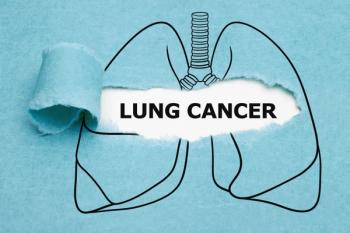
Multidisciplinary Lung Cancer Clinic Saves Patients, System Costs
Multidisciplinary lung cancer clinics might help patients and the system save on treatment costs while improving patient experiences, according to an abstract presented at CHEST 2020.
Spending less on
Collaborative, multidisciplinary discussions and care have been shown to reduce costs and facilitate better disease management.2,3 The new economic evaluation assessed a clinic at Kingston Health Sciences Centre (KHSC) in Kingston, Ontario, Canada, where a
In the new study, researchers retrospectively assessed resource use and costs when an MDC model was implemented in lung cancer care over a nearly 2-year period. They examined costs from the societal level and presented the findings in 2019 Canadian dollars (CDN).
Patient data from February 2017 to December 2018 informed the analysis of total cost savings due to less clinic visits. Researchers also factored in productivity loss, travel expenses, and the administrative costs related to booking visits. The data included 350 patients seen at the MDC, with 271 (77%) of the participants over 65 years of age.
Over the course of the study, the MDC patients required 1.06 fewer oncology visits between lung cancer diagnosis and treatment initiation, for a total of 371 fewer oncology visits for the patient population overall.
The Government of Canada automobile allowance rate ($0.58/km [$0.44 USD per km]) and mean round trip distance to KHSC from patients’ homes (101.96 km per visit) were used to estimate travel costs, which amounted to about $21,940.94 ($16,535.49 USD) in savings. Parking-related expense savings were about $2,226 ($1,677.59 USD). The total of $24,166.94 ($18,213.08 USD) in savings between 350 patients amounted to roughly $70 ($52.75 USD) per patient.
Patient and caregiver productivity loss was estimated using the average wage for Canadians over 25 years of age ($29.55/hour [$22.27 USD]), and included all patients under 65 years of age (23% of the study population). Researchers factored in travel time (61.2 minutes), clinic visit time (75.6 minutes), parking or time spent locating the clinic (15 minutes), and an average of 1.25 caregivers per patient.
Total patient and caregiver productivity-loss cost savings were estimated at $6,379.40 ($4,807.75 USD) and $17,335.32 ($13,064.53 USD), respectively. Clinic administrative level savings amounted to $508.27 ($383.05 USD), assuming 3 minutes per booking and an average wage of $27.33 ($20.60 USD) per hour.
The study concluded that the lung cancer MDC led to economic benefits for both patients and the health care system, with an estimated total cost reduction of $48,389.93 ($36,468.41 USD) (range: $37,173.37 - $122,896.42 [$28,015.20 - $92.619.20 USD]) over the roughly 2-year period for 350 patients. The benefits were enough to consider the study evidence in favor of MDCs for lung cancer care.
[Editor’s note: All monetary conversions were done using
References
1. Johnson A, Katyukha A, Stone C, Parker C, Robinson A, Digby G. Patient and health system cost savings in a multidisciplinary lung cancer clinic. Presented at: CHEST 2020; October 18-21, 2020. Abstract A1334. doi:10.1016/j.chest.2020.08.1212
2. Rosenberg J. Multidisciplinary Collaborative Care Reduces Costs, Improves End-of-Life Care for Patients With IPF. July 25, 2020. Accessed November 18, 2020.
3. Rosenberg J. Multidisciplinary Discussion Benefits Diagnosis, Management of ILD, Study Finds. September 18, 2020. Accessed November 18, 2020.
4. Stone C, Robinson A, Brown E, et al. Improving Timeliness of Oncology Assessment and Cancer Treatment Through Implementation of a Multidisciplinary Lung Cancer Clinic. J Oncol Pract. 2019;15(2):e169-e177. doi:10.1200/JOP.18.00214
Newsletter
Stay ahead of policy, cost, and value—subscribe to AJMC for expert insights at the intersection of clinical care and health economics.









